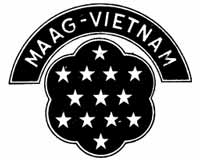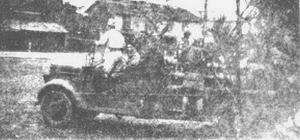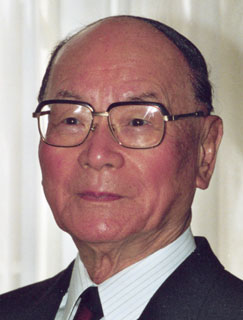|
Huang Chao-chin
Huang Chao-chin (黃朝琴, Taiwanese: N̂g Tiâu-khîm, October 25, 1897 – July 5, 1972), known by the courtesy name Lan-ting and pen name Chao Jin, Nien-tai, was Taiwanese diplomat and politician. Born in Yanshui Port, Chiayi County, Taiwan under Japanese rule (now Yanshuei District, Tainan), he pursued his early education in Japan and later studied public international law in the United States. Upon completion of his studies, he went to the Republic of China to serve in the Ministry of Foreign Affairs of the Nationalist government. He held various positions including Provincial Speaker and member of the Central Committee of the Kuomintang, and presided over the Taiwan Provincial Assembly for nearly two decades. Early life and education Huang Chao-chin was born on October 25, 1897, in Yanshui Port, Chiayi County, Japanese Taiwan. After the death of his grandfather and father when he was ten years old, his mother, Cai, raised him and his younger siblings.周宗贤. 《黃� ... [...More Info...] [...Related Items...] OR: [Wikipedia] [Google] [Baidu] |
Taiwan Provincial Consultative Council
The Taiwan Provincial Consultative Council (TPCC) was the council of the streamlined Taiwan Province of the Republic of China. In July 2018, all duties of the Taiwan Provincial Government and TPCC were transferred to the National Development Council and other ministries of the Executive Yuan. History Taiwan Provincial Consultative Council was originally established on 1 May 1946 as Taiwan Representative Council. It was renamed Provisional Taiwan Provincial Council in December 1951 and Taiwan Provincial Council in June 1959. As all council members were democratically elected, until 1991 National Assembly election and 1992 legislative election, it was the most recognized democratic legislature in Taiwan. In 1996, President Lee Teng-hui decided to abolish most of the governmental functions of Taiwan Province. It was reconstituted as Taiwan Provincial Consultative Council with the streamlining of the Taiwan Provincial Government in 1998. On July 1, 2018, by a resolution passed ... [...More Info...] [...Related Items...] OR: [Wikipedia] [Google] [Baidu] |
Kuomintang
The Kuomintang (KMT) is a major political party in the Republic of China (Taiwan). It was the one party state, sole ruling party of the country Republic of China (1912-1949), during its rule from 1927 to 1949 in Mainland China until Retreat of the government of the Republic of China to Taiwan, its relocation to Taiwan, and in Taiwan Martial law in Taiwan, ruled under martial law until 1987. The KMT is a Centre-right politics, centre-right to Right-wing politics, right-wing party and the largest in the Pan-Blue Coalition, one of the two main political groups in Taiwan. Its primary rival is the Democratic Progressive Party (DPP), the largest party in the Pan-Green Coalition. As of 2025, the KMT is the largest single party in the Legislative Yuan and is chaired by Eric Chu. The party was founded by Sun Yat-sen in 1894 in Honolulu, Hawaii, as the Revive China Society. He reformed the party in 1919 in the Shanghai French Concession under its current name. From 1926 to 1928, the K ... [...More Info...] [...Related Items...] OR: [Wikipedia] [Google] [Baidu] |
Hsu Shih-hsien
Hsu Shih-hsien (; 1 April 1908 – 30 June 1983) was a Taiwanese academic and politician. Born in 1908 in Japanese Taiwan, Hsu opposed colonialism at an early age. As a student, she refused to acknowledge Hirohito's birthday and defended others who spoke Hokkien. Hsu later became the first Taiwanese woman to earn a doctorate. She was also the first female high school principal and city council member in Taiwan. In 1940, Hsu and her husband established a hospital in Chiayi City. Hsu joined the Kuomintang after their arrival in Taiwan in 1945, and was later elected to the Taiwan Provincial Assembly. She attempted to withdraw from the party three times, after disagreeing with the suspension of county commissioner Lee Mao-sung before courts had ruled on charges of corruption against him. She was reelected to the Taiwan Provincial Assembly as an independent in April 1957. Hsu was formally expelled from the Kuomintang in 1958, because she had joined the Chinese Local Autonomy Rese ... [...More Info...] [...Related Items...] OR: [Wikipedia] [Google] [Baidu] |
Chung Chao-cheng
Chung Chao-cheng (; Hakka Pha̍k-fa-sṳ: ''Chûng Sau-chṳn''; Taiwanese ; 20 January 1925 – 16 May 2020) was a Taiwanese novelist of Hakka descent born in the Hsinchu Prefecture during the Japanese rule period (now part of Lungtan District, Taoyuan City). Revered as the "Mother of Taiwanese Literature" in Taiwan, he is also frequently mentioned alongside Taiwanese writer Yeh Shih-tao, collectively known as "North Chung, South Yeh". Early life Chung was born on 20 January 1925, in Longtan District, Taoyuan. Under Japanese rule, the subdivision was classified as a village by the name of Ryūtan, itself a part of Daikei, in Shinchiku Prefecture. His father was a schoolteacher and principal. Chung was sixth of ten siblings, and the only son. He enrolled successively at the and then the Changhua Normal School, and later studied at National Taiwan University, but did not complete a degree in the Department of Chinese Language and Literature, due to a bout of malaria. He le ... [...More Info...] [...Related Items...] OR: [Wikipedia] [Google] [Baidu] |
Military Assistance Advisory Group
A Military Assistance Advisory Group (MAAG) is a designation for a group of United States military advisors sent to other countries to assist in the training of conventional armed forces and facilitate military aid. Although numerous MAAGs operated around the world throughout the 1940s–1970s, including in Yugoslavia after 1951, and to the Ethiopian Armed Forces, the most famous MAAGs were those active in South Vietnam, Cambodia, Laos, and Thailand, before and during the Vietnam War. Records held by the National Archives and Records Administration detail the activities of numerous assistance advisory groups. Typically, the personnel of MAAGs were considered to be technical staff attached to, and enjoying the privileges of, the US diplomatic mission in a country. "The special status of personnel serving in Military Advisory Assistance Groups (MAAG) results from their position as an integral part of the Embassy of the United States where they perform duty." Although the term is ... [...More Info...] [...Related Items...] OR: [Wikipedia] [Google] [Baidu] |
William C
William is a masculine given name of Germanic origin. It became popular in England after the Norman conquest in 1066,All Things William"Meaning & Origin of the Name"/ref> and remained so throughout the Middle Ages and into the modern era. It is sometimes abbreviated "Wm." Shortened familiar versions in English include Will or Wil, Wills, Willy, Willie, Bill, Billie, and Billy. A common Irish form is Liam. Scottish diminutives include Wull, Willie or Wullie (as in Oor Wullie). Female forms include Willa, Willemina, Wilma and Wilhelmina. Etymology William is related to the German given name ''Wilhelm''. Both ultimately descend from Proto-Germanic ''*Wiljahelmaz'', with a direct cognate also in the Old Norse name ''Vilhjalmr'' and a West Germanic borrowing into Medieval Latin ''Willelmus''. The Proto-Germanic name is a compound of *''wiljô'' "will, wish, desire" and *''helmaz'' "helm, helmet".Hanks, Hardcastle and Hodges, ''Oxford Dictionary of First Names' ... [...More Info...] [...Related Items...] OR: [Wikipedia] [Google] [Baidu] |
Office Of The President Of The Taiwan
The Office of the President () is an organ of the Republic of China (Taiwan) that handles the general administrative affairs of the President and the Vice President. The office, together with the National Security Council, serve as the two advisory agencies to the President. The Office of the President is led by a Secretary-General and oversees the Academia Sinica and Academia Historica. History The Office of the President was established according to the Constitution of the Republic of China on May 20, 1948 in the Presidential Palace in Nanjing, with the inauguration of the first President Chiang Kai-shek and the first Vice President Li Zongren. However, with the outbreak of Chinese Civil War, the government of the Republic of China retreated to Taiwan in December 1949. On March 1, 1950, Chiang Kai-shek resumed his presidency in the former office of the Japanese Government-General of Taiwan in Taipei. The building is used as the Presidential Office Building since then. ... [...More Info...] [...Related Items...] OR: [Wikipedia] [Google] [Baidu] |
Liu Mingchuan
Liu Mingchuan () (1836–1896), courtesy name Xingsan, was a Chinese military general and politician during the late Qing dynasty. He was born in Hefei, Anhui. Liu became involved in the suppression of the Taiping Rebellion at an early age, and worked closely with Zeng Guofan and Li Hongzhang as he emerged as an important Huai Army officer. In the aftermath of the Sino-French War, succeeding Ding Richang he was appointed the first governor of the newly established Taiwan Province (Qing), Taiwan Province. Today he is remembered for his efforts in modernizing Taiwan during his tenure as governor, and several institutions have been given his name, including Ming Chuan University in Taipei. Early life and military career Liu was born into a poor family of farmers at Hefei, Anhui, Anhui Province. His father died when Liu was 11 years old. At age 18, Liu joined a local gang of bandits in the mountains, and at 20 he took part in the early Nien Rebellion. At 23 he changed his mind and ... [...More Info...] [...Related Items...] OR: [Wikipedia] [Google] [Baidu] |
Wu Chuo-liu
Wu Chuo-liu (), born Wu Jiantian () (2 June 1900, Xinpu, Hsinchu, Shimpu, Shinchiku – 7 October 1976, Taipei?) was an influential Taiwanese journalist and novelist of Hakka ancestry. He has been described as the most powerful witness to history in Taiwanese letters. Many of his most important novels were first written in Japanese. Life and work His family was long established in Shimpu in what is now called Hsinchu County. His grandfather, Wu Fang-hsin, was a well-known traditional poet. He began with a standard Chinese education but, due to the Taiwan under Japanese rule, Japanese rule, most of his studies were conducted in the Japanese manner. In 1916, he was admitted to the "". In 1919, he visited Japan for the first time on a school trip that lasted 18 days—it was an eye opener. He graduated in 1920 and became a teacher in the public schools. After publishing an article called "School and Autonomy", he was labeled a radical by the Japanese government and transferred ... [...More Info...] [...Related Items...] OR: [Wikipedia] [Google] [Baidu] |
February 28 Incident
The February 28 incident (also called the February 28 massacre, the 228 incident, or the 228 massacre) was an anti-government uprising in Taiwan in 1947 that was violently suppressed by the Kuomintang–led nationalist government of the Republic of China (1912–1949), Republic of China (ROC). Directed by Taiwan Province, provincial governor Chen Yi (Kuomintang), Chen Yi and president Chiang Kai-shek, thousands of civilians were killed beginning on February 28. The incident is considered to be one of the most important events in Taiwan's modern history and was a critical impetus for the Taiwan independence movement, Taiwan independence movement. In 1945, following the surrender of Japan at the End of World War II in Asia, end of World War II, the Allies of World War II, Allies handed administrative control of Taiwan over to China, thus ending 50 years of Taiwan under Japanese rule, Japanese colonial rule. Local residents became resentful of what they saw as high-handed and ... [...More Info...] [...Related Items...] OR: [Wikipedia] [Google] [Baidu] |
Taipei
, nickname = The City of Azaleas , image_map = , map_caption = , pushpin_map = Taiwan#Asia#Pacific Ocean#Earth , coordinates = , subdivision_type = Country , subdivision_name = Taiwan , established_title = Settled , established_date = 1709 , established_title1 = Renamed Taihoku , established_date1 = 17 April 1895 , established_title2 = Provincial city (Taiwan), Provincial city status , established_date2 = 25 October 1945 , established_title3 = Retreat of the government of the Republic of China to Taiwan, Provisional national capital , established_date3 = 7 December 1949 , established_title4 = Reconstituted as a Yuan-controlled municipality , established_date4 = 1 July 1967 , capital_type = City seat , capital = Xinyi District, Taipei, Xinyi District , largest_settlement ... [...More Info...] [...Related Items...] OR: [Wikipedia] [Google] [Baidu] |
Mayor Of Taipei
The mayor of Taipei is the head of the Taipei City Government and is elected to a four-year term. Until the election of Tsai Ing-wen, the office was seen as a stepping stone to the President of the Republic of China, presidency: presidents Lee Teng-hui, Chen Shui-bian and Ma Ying-jeou have all held this position prior to being elected president. Taipei was elevated as a Special municipality (Taiwan), special municipality from 1967. The mayor was a position appointed by the central government from 1967 to 1994, and the first public election for Mayor of Taipei was held in 1994. The incumbent mayor is Chiang Wan-an. Titles of the Mayor List of Mayors Prefectural city era (appointed mayors) Provincial city era (appointed mayors) Provincial city era (directly elected mayors) Special municipality era (appointed mayors) Special municipality era (directly elected mayors) Timeline Electoral history Taipei Mayoral Election, 1994 Taipei Mayoral Election, 1998 ... [...More Info...] [...Related Items...] OR: [Wikipedia] [Google] [Baidu] |






